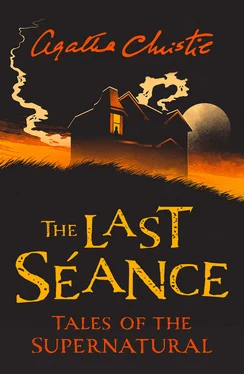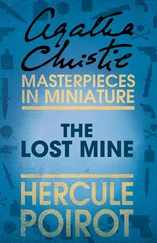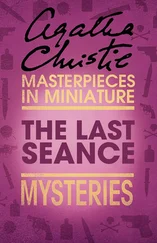‘Ah!’ said Mr Dinsmead. ‘The mortal image of her Ma! So go along with you, and don’t let’s waste any more time.’
He strolled about the room humming to himself for a minute or two. Once he approached the window and looked out.
‘Wild weather,’ he murmured to himself. ‘Not much likelihood of our having visitors tonight.’
Then he too left the room.
About ten minutes later Mrs Dinsmead entered bearing a dish of fried eggs. Her two daughters followed, bringing in the rest of the provisions. Mr Dinsmead and his son Johnnie brought up the rear. The former seated himself at the head of the table.
‘And for what we are to receive, etcetera,’ he remarked humorously. ‘And blessings on the man who first thought of tinned foods. What would we do, I should like to know, miles from anywhere, if we hadn’t a tin now and then to fall back upon when the butcher forgets his weekly call?’
He proceeded to carve corned beef dexterously.
‘I wonder who ever thought of building a house like this, miles from anywhere,’ said his daughter Magdalen pettishly. ‘We never see a soul.’
‘No,’ said her father. ‘Never a soul.’
‘I can’t think what made you take it, Father,’ said Charlotte.
‘Can’t you, my girl? Well, I had my reasons—I had my reasons.’
His eyes sought his wife’s furtively, but she frowned.
‘And haunted too,’ said Charlotte. ‘I wouldn’t sleep alone here for anything.’
‘Pack of nonsense,’ said her father. ‘Never seen anything, have you? Come now.’
‘Not seen anything perhaps, but—’
‘But what?’
Charlotte did not reply, but she shivered a little. A great surge of rain came driving against the window-pane, and Mrs Dinsmead dropped a spoon with a tinkle on the tray.
‘Not nervous are you, Mother?’ said Mr Dinsmead. ‘It’s a wild night, that’s all. Don’t you worry, we’re safe here by our fireside, and not a soul from outside likely to disturb us. Why, it would be a miracle if anyone did. And miracles don’t happen. No,’ he added as though to himself, with a kind of peculiar satisfaction. ‘Miracles don’t happen.’
As the words left his lips there came a sudden knocking at the door. Mr Dinsmead stayed as though petrified.
‘Whatever’s that?’ he muttered. His jaw fell.
Mrs Dinsmead gave a little whimpering cry and pulled her shawl up round her. The colour came into Magdalen’s face and she leant forward and spoke to her father.
‘The miracle has happened,’ she said. ‘You’d better go and let whoever it is in.’
Twenty minutes earlier Mortimer Cleveland had stood in the driving rain and mist surveying his car. It was really cursed bad luck. Two punctures within ten minutes of each other, and here he was, stranded miles from anywhere, in the midst of these bare Wiltshire downs with night coming on, and no prospect of shelter. Serve him right for trying to take a shortcut. If only he had stuck to the main road! Now he was lost on what seemed a mere cart-track, and no idea if there were even a village anywhere near.
He looked round him perplexedly, and his eye was caught by a gleam of light on the hillside above him. A second later the mist obscured it once more, but, waiting patiently, he presently got a second glimpse of it. After a moment’s cogitation, he left the car and struck up the side of the hill.
Soon he was out of the mist, and he recognized the light as shining from the lighted window of a small cottage. Here, at any rate, was shelter. Mortimer Cleveland quickened his pace, bending his head to meet the furious onslaught of wind and rain which seemed to be trying its best to drive him back.
Cleveland was in his own way something of a celebrity though doubtless the majority of folks would have displayed complete ignorance of his name and achievements. He was an authority on mental science and had written two excellent text books on the subconscious. He was also a member of the Psychical Research Society and a student of the occult in so far as it affected his own conclusions and line of research.
He was by nature peculiarly susceptible to atmosphere, and by deliberate training he had increased his own natural gift. When he had at last reached the cottage and rapped at the door, he was conscious of an excitement, a quickening of interest, as though all his faculties had suddenly been sharpened.
The murmur of voices within had been plainly audible to him. Upon his knock there came a sudden silence, then the sound of a chair being pushed back along the floor. In another minute the door was flung open by a boy of about fifteen. Cleveland could look straight over his shoulder upon the scene within.
It reminded him of an interior by some Dutch Master. A round table spread for a meal, a family party sitting round it, one or two flickering candles and the firelight’s glow over all. The father, a big man, sat one side of the table, a little grey woman with a frightened face sat opposite him. Facing the door, looking straight at Cleveland, was a girl. Her startled eyes looked straight into his, her hand with a cup in it was arrested halfway to her lips.
She was, Cleveland saw at once, a beautiful girl of an extremely uncommon type. Her hair, red gold, stood out round her face like a mist, her eyes, very far apart, were a pure grey. She had the mouth and chin of an early Italian Madonna.
There was a moment’s dead silence. Then Cleveland stepped into the room and explained his predicament. He brought his trite story to a close, and there was another pause harder to understand. At last, as though with an effort, the father rose.
‘Come in, sir—Mr Cleveland, did you say?’
‘That is my name,’ said Mortimer, smiling.
‘Ah! yes. Come in, Mr Cleveland. Not weather for a dog outside, is it? Come in by the fire. Shut the door, can’t you, Johnnie? Don’t stand there half the night.’
Cleveland came forward and sat on a wooden stool by the fire. The boy Johnnie shut the door.
‘Dinsmead, that’s my name,’ said the other man. He was all geniality now. ‘This is the Missus, and these are my two daughters, Charlotte and Magdalen.’
For the first time, Cleveland saw the face of the girl who had been sitting with her back to him, and saw that, in a totally different way, she was quite as beautiful as her sister. Very dark, with a face of marble pallor, a delicate aquiline nose, and a grave mouth. It was a kind of frozen beauty, austere and almost forbidding. She acknowledged her father’s introduction by bending her head, and she looked at him with an intent gaze that was searching in character. It was as though she were summing him up, weighing him in the balance of her young judgement.
‘A drop of something to drink, eh, Mr Cleveland?’
‘Thank you,’ said Mortimer. ‘A cup of tea will meet the case admirably.’
Mr Dinsmead hesitated a minute, then he picked up the five cups, one after another, from the table and emptied them into the slop bowl.
‘This tea’s cold,’ he said brusquely. ‘Make us some more, will you, Mother?’
Mrs Dinsmead got up quickly and hurried off with the teapot. Mortimer had an idea that she was glad to get out of the room.
The fresh tea soon came, and the unexpected guest was plied with viands.
Mr Dinsmead talked and talked. He was expansive, genial, loquacious. He told the stranger all about himself. He’d lately retired from the building trade—yes, made quite a good thing of it. He and the Missus thought they’d like a bit of country air—never lived in the country before. Wrong time of year to choose, of course, October and November, but they didn’t want to wait. ‘Life’s uncertain, you know, sir.’ So they had taken this cottage. Eight miles from anywhere, and nineteen miles from anything you could call a town. No, they didn’t complain. The girls found it a bit dull, but he and mother enjoyed the quiet.
Читать дальше












